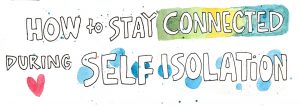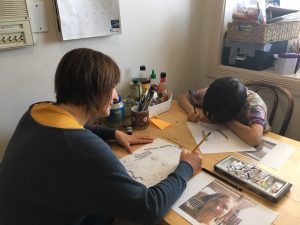 The Covid19 pandemic has had a profound affect on our world and how we move through it. Whatever you are feeling right now is deserving of kindness and attention.
The Covid19 pandemic has had a profound affect on our world and how we move through it. Whatever you are feeling right now is deserving of kindness and attention.
While we would never have invited this pandemic, paradoxically it is giving many of us the opportunity to re-examine our values, simplify and focus on what’s important, and connect with ourselves and others in a new way.
Rather than social distancing, Swan of the Path Yoga Studio, my wise friend and teacher, suggested we call this practice cocooning. This hiaitus from the way we are used to being and moving in the world may just be like going into a crysalis. I am hopeful that we come out of this with new colours, and wings to take flight!
In the confines of our family home, it’s disorienting to know that many people are in quarantined battle with Covid19. Many people are experiencing intense loneliness, isolation, economic and existential terror, while others are grateful for every moment of health and wellbeing.
Author Esfafani Smith has studied how people cope best under adversity. She reminds us of the term “tragic optimism”. Coined by Viktor Frankel, psychiatrist, Holocaust survivor, and author of Man’s Search for Meaning, tragic optimism is “the ability to maintain hope and find meaning in life despite its inescapable pain, loss, and suffering”.
I find myself thinking a lot about my beloved grandparents who survived unimaginable losses and trauma during the Holocaust. They went on to start a family, and relocated three times, first to Munich, then Israel, and lastly Montreal. They were no stranger to strife and insecurity, and yet they persevered to give me a depth of love and devotion that to this day holds me up on the inside.
Our generation has never faced this breed of predator who is invisible, unpredictable, lethal, and unstoppable except by physical distancing, and vigilant hygiene. I watch myself, my loved ones, my local and global community face unprecedented danger and uncertainty.
To detour away from fear, doom and dread, we need wisdom and guidance. By necessity, I find myself digging deep to find meaning in this madness, and to access the deeper strength that kept my grandparents going when they lost everything.
Cocooning at home, masks, and diligent hand hygiene aside, we are helpless to stop the trajectory of Covid19. However we can choose to work with our thoughts, feelings, and behaviour so that we feel less anxious, and more at ease.
Taking the advice of psychologists Drs. Ange Cooper and Jessica Bolton, kind attention to these four areas of life can help:
- Support/Connection.
- Health (physical, emotional, mental health)
- Play
- Sleep.
Below you will find steps for de-escalating anxiety, and using self compassion to alleviate fear.
At very bottom are links to respected practitioners who are offering online embodiment practices such as movement, dance, yoga, drumming, writing, Jungian Dream Work, and expressive arts.
Whatever you are feeling right now is deserving of kindness and attention.
Research attests that our physical, emotional and mental health is enhanced when we focus on being present with ourselves.
Right now we are vulnerable to Covid19 but moreso to the pervasive fear contagion that threatens our mental health.
Focusing on positive, healthy actions diminishes fear, and fosters an internal sense of confidence and capacity. Click here for some ideas to help you create health and balance under quarantine conditions.
The following practice, Self Compassion To Alleviate Fear, can help you release fight, flight, freeze, fold reaction by bringing curiosity and care to this powerful emotion, and embodying rest and relaxation.
Self Compassion to Alleviate Fear:
What is Fear?
Fear is a survival emotion that lights up the part of our brain wired to fight, flee, freeze, or fold into collapse.
Fear is a normal reaction to the contagion effect that’s gripping our collective mind.
Excessive fear, and the tendency to avoid it with compulsive or avoidant behaviour is not healthy or sustainable.
Fear is not who you are, but a core emotion that arises to help us adapt.
To work with fear effectively, it helps to adopt a stance of openness and wisdom with fear to enhance our resilience.
Whatever you are feeling right now is deserving of kindness and attention.
The practice below is similar to the Vipassana technique developed by Michelle Macdonald, and taught by Tara Brach called RAIN which stands for:
Recognize what is happening
Allow life to be just as it is
Investigate inner experience with kindness; and rest in the
Natural state of awareness or non-identification.
Steps:
1. Preparation
Do this practice when you feel safe, or with a friend or loved one who can support you, and in a place where you won’t be disturbed. Prepare yourself by taking some time to do something you enjoy and relaxes you, such as taking a bath, stretching, drawing, reading poetry, or connecting with nature.
2. Focus
Sit quietly, focus on what you feel inside.
3. Name Fear
Identify the thoughts that are driving fear. What are you afraid of?
4. Drop the Content
Drop the content, meaning let the thoughts go – imagine them dissolving into dust, mist, or like leaves floating down the river.
5. Turn Fear Into An Object
Make your fear into an object, or give it a shape. Is it a ball of steel wire, or maybe a storm cloud?
6. Relate to It with Kindness & Curiousity
Focus on the object. Where do you feel it in your body?
If you can and feel comfortable to do so, put your hands on it.
Does this fear have a need?
See if you can you meet the need with reassuring thoughts the way you would do for your child, or for someone you care about, such as “It’s going to be ok.”, “I’m here for you”, “We are safe now”.
Breathe compassion and kindness into the sensation.
See if it helps to imagine a beam of wise, comforting light shining into the fear.
7. Rest & Appreciate
You did it! Appreciate yourself for doing this practice.
You took a creative path by experimenting with a new, and more adaptive way to deal with fear.
Notice what you feel in your body now.
If you have time, do some journaling about your experience, draw a picture, or move to music, whatever your body needs to do now.
Uplifting Virtual Connections:
Yoga with Swan Online – Amazing teacher!
More Yoga Online – Take your pick! I recommend our own, Susan Alexander.
Yoga Online with Stretch. They need our support to keep their studio going!
Time to Write? Join Pandora’s Collective for inspiration!
5 Rhythms with Marcia F. W. Jones
Drum away your tension with Alexandra Jai
Make an investment in Jungian Dream Work for Women with Marlene Schiwy

